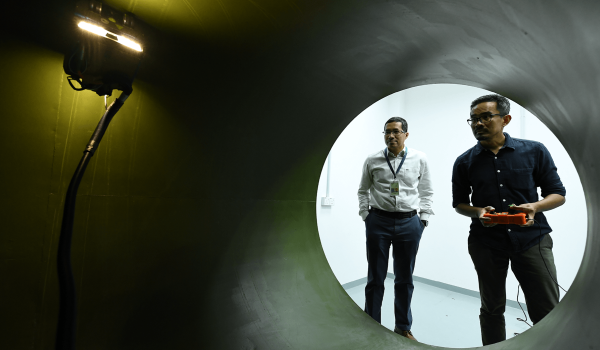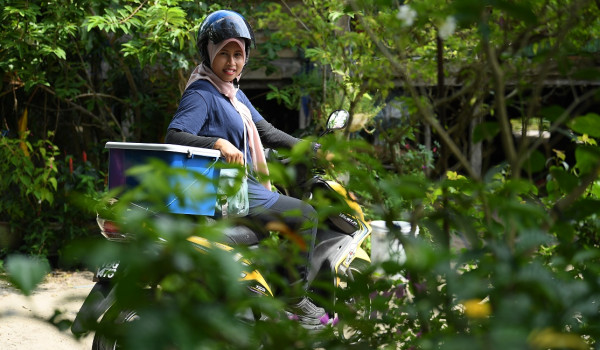Sustaining life through sustainable seas
The ocean spans three-quarters of the Earth’s surface, holds 97% of its water and provides 99% of the planet’s living space by volume. However, this vast realm is currently under siege. Climate change, warming waters, pollution and collapsing biodiversity are eroding Malaysia’s coastal ecosystems—critical bulwarks for food supplies and livelihoods. As the tides turn, so too does the fate of those who depend on them.
The energy industry is certainly not spared from such crisis. With approximately 12,000 aging platforms worldwide, traditional decommissioning alternatives are costly and complex. As one of the world’s key energy solutions providers, PETRONAS is committed to conserving the environment by adopting effective strategies in repurposing our massive, decommissioned infrastructures such as our offshore oil and gas platforms.
Through PETRONAS’ Rigs-to-Reef initiative, our decommissioned offshore structures were converted into thriving marine habitats that restore biodiversity and support coastal communities. Our approach is aligned with United Nations’ “Life Below Water” Sustainable Development Goal, demonstrating responsible development of marine conservation.
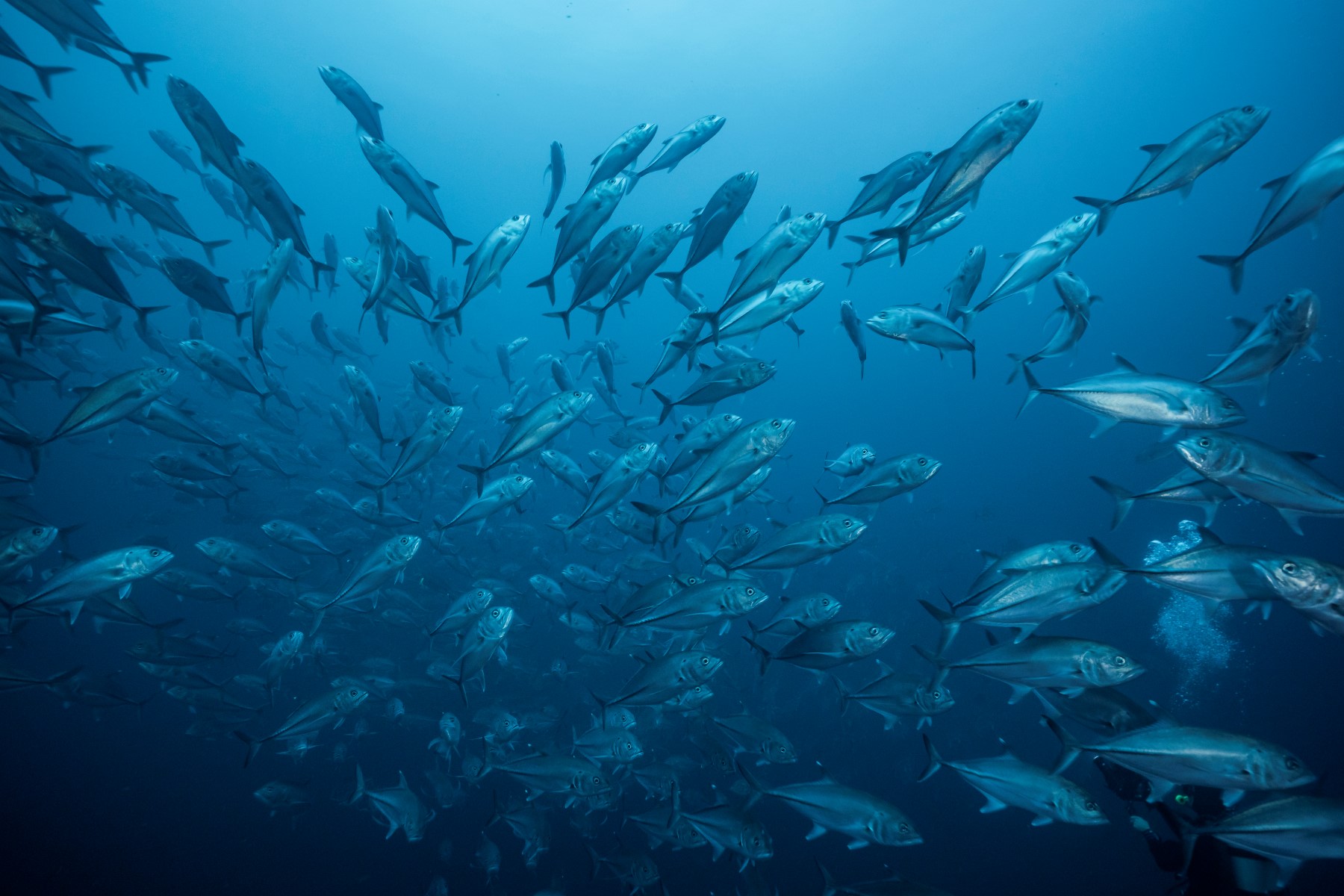
A large school of fish gracefully swims through clear waters, demonstrating the flourishing marine populations that benefit from the sustainable practices of the PETRONAS Rigs-to-Reef Initiative. Photo taken at the Dana platform.
Creating the legacy of sustainable seas
PETRONAS’ Rigs-to-Reef initiative began twenty years ago with the transformation of the damaged Baram-8 platform in Sarawak into an artificial reef for marine biodiversity by restoring, sustaining and enhancing their habitats.
Using monitoring data provided by the Department of Fisheries, Terengganu, our sustainable approach via this method has yielded measurable results. In 2021, our artificial reef structures in Pulau Kapas, Terengganu showed remarkable ecological success with a 30% expansion in fish biodiversity alongside a consistent 10% yearly increase in the availability of fish nutrition resources.
This is only one out of many initiatives that we have in marine conservation as part of our 'Thriving with Nature' sustainability commitment. Thanks to our pioneering ideas on innovative reefing projects, we can continue with many more currently in motion. This legacy beneath the waves would not be possible if not for our capacity and capability in creating science-driven solutions, forming solid collaboration between us and our partners and cultivating long-term stewardship that’s well-focused and truly committed, thus reinforcing our pivotal role in marine life conservation.
Waves of efforts
The Rigs-to-Reef initiative brought together diverse stakeholders namely government agencies, environmental organisations and fishermen where collaborations and partnerships were forged, resulting in fruitful results with favourable improvements in marine habitats, marine species and their ecosystem.
Similarly, the Tubular-to-Reef project converted decommissioned steel tubulars into artificial reefs, creating new habitats for marine life thus enhancing biodiversity. Through a partnership with Sumitomo Corporation’s subsidiary company, SC Tubular Solutions Malaysia Sdn Bhd and Department of Fisheries Malaysia, we were able to submerge 10 tubular-turned-artificial reefs in Kapas Island and Sibu Island in 2023. This initiative is aligned with principles of circular economy where waste is minimised and resources used are optimised. What was most compelling was that PETRONAS was involved in an innovative initiative using tubular steel; it also included a transfer of a 100-year-old Japanese history, experience and know-how in artificial reefing.
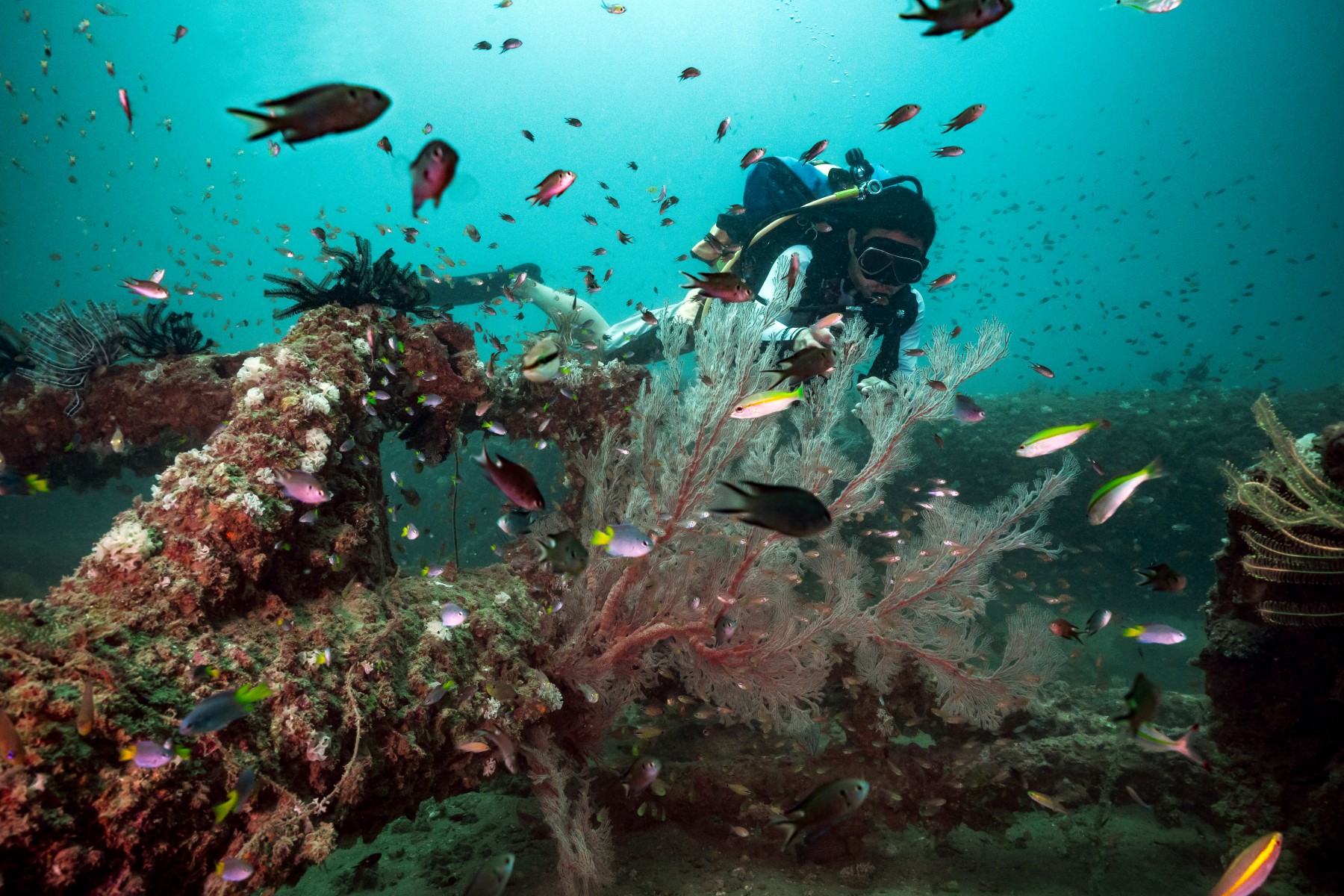
An underwater diver explores a vibrant artificial reef structure, surrounded by various fish, emphasising the success of the initiative in enhancing marine habitats. Photo taken at the Baram-8 platform.
A post-installation monitoring and analysis exercise was carried out a year later and it was found that fish biomass increased up to 3.35kg/M3 and biodiversity flourished with 42 unique species identified across all artificial reef structures. To ensure continued success and long-term sustainability, future efforts will focus on refining strategies, identifying reefing locations, enhancing structural design and implementing consistent monitoring plans.
In addition, we introduced the Fish Aggregating Devices (FAD)—a safety outreach programme where we set alternative fishing grounds away from restricted zones, ensuring fishermen remain outside the 500m safety radius of PETRONAS' offshore operation. This project was realised in 2017 through collaborative efforts between PETRONAS, the Sabah Government, the Sabah Reef Plan, and the Department of Fisheries Sabah.
To further reflect our commitment, we embarked on a 10-year strategy called The Malaysia Master Reefing Plan in 2024, in partnership with the Department of Fisheries Sabah for repurposing decommissioned offshore platforms in Malaysia into artificial reefs. This ambitious project requires comprehensive assessment studies and multiple evaluations under the Rigs-to-Reef framework to determine optimal placement—either in current location) or in other locations.
All in all, with sustainability of marine life and coastal communities as our goal, our approach consistently leverages on cutting-edge technologies and solutions, regardless of project scale, while effectively bridging the gap between industrial energy operations and environmental stewardship.
Forging partnerships, shared progress
To achieve our sustainability goals and support the United Nations' "Life Below Water" goal, we formed strategic alliances with key stakeholders from state governments, government bodies, private sectors, investors, technology partners, to local communities.
Partners with skilled expertise like Sumitomo are vital in providing tubular products for offshore drilling and bringing the Tubular-to-Reef initiative to life; while collaboration with the Department of Fisheries Malaysia (DOF) and Hibiscus Petroleum ensured the transformation of the South Angsi Alpha platform— a decommissioned offshore oil rig that operated for 14 years in Terengganu waters - into artificial reefs that complement Pulau Tenggol's rich coral reef ecosystems.
Continuous collaboration with our stakeholders fosters opportunities to enhance our efforts and accelerate innovations in pursuit of our shared progress for sustainability.
Facing the challenges
We faced many challenges in our efforts in transforming decommissioned oil rigs into artificial reefs. These include technological, social, and environmental obstacles, alongside limitations in infrastructure, monitoring systems, impact assessments, integrated data management, and community engagement. However, those challenges made us more determined to ensure that all initiatives became successful, and have a positive impact on the marine ecosystem, community and collaborators.
On top of that, our main concern is ensuring the structural integrity of the reefs in unstable marine environments. To address this, we have adopted AI-driven monitoring and advanced structural engineering techniques, which bolster the resilience of these artificial reefs against unpredictable currents and human interference.
Navigating the regulatory landscape is another significant challenge, as governments and agencies enforce stringent guidelines for reefing initiatives. This made close collaboration with regulatory bodies crucial to establish clear protocols for reefing proposals, focusing on structural stability, environmental benefits, and site clearance standards.
Due to the nature of the initiative and lack of public awareness, it is only natural that we received scepticism about the effectiveness of reefing projects. To address this, educational campaigns highlighting the ecological benefits of artificial reefs are essential and are key to building trust and credibility for our initiatives.
Legacy beneath the waves and beyond
PETRONAS is committed to securing a thriving future for Malaysia's marine ecosystems through strategic innovation and sustainable development. Our comprehensive approach integrates cutting-edge conservation solutions, strategic partnerships and community programmes to create lasting environmental and social value.
As one of the global energy leaders, we remain dedicated to optimising our reef design methodologies, enhancing monitoring protocols and implementing data-driven improvement strategies. Our efforts from Terengganu, Sarawak to Sabah reflect our commitment to scaling positive impact across Malaysia's coastal regions.
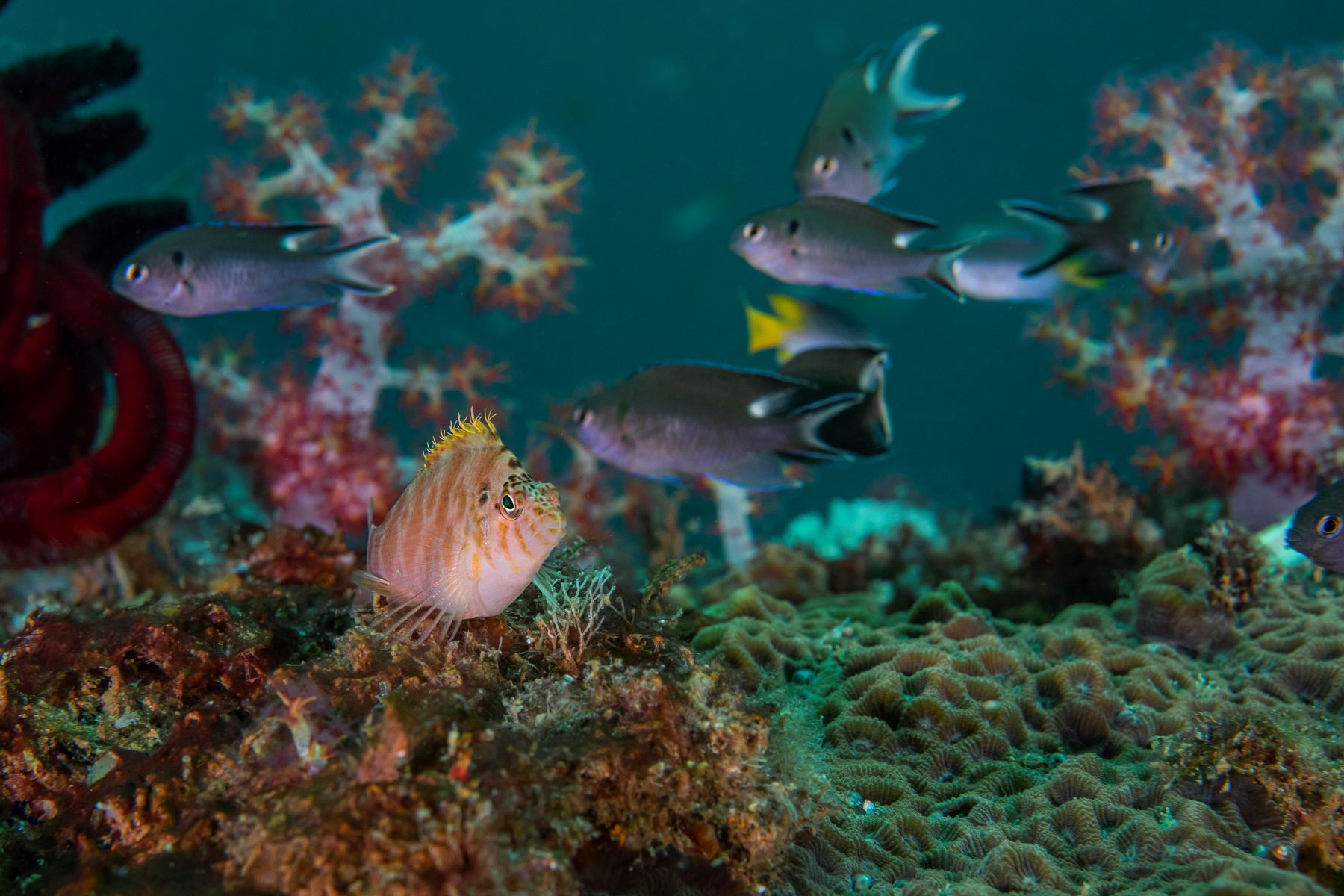
A close-up of diverse fish species within a coral reef, showcasing the thriving marine life nurtured by the PETRONAS Rigs-to-Reef Initiative. Photo taken at the Baram-8 platform.
This pivotal marine stewardship delivers dual benefits: advancing national sustainability objectives while simultaneously creating economic opportunities for coastal populations. By aligning environmental preservation with community prosperity, PETRONAS is establishing a sustainable legacy that will benefit marine biodiversity and Malaysian communities for generations to come.
What’s next
PETRONAS envisions a future where Malaysia’s marine ecosystems thrive through sustainable solutions, innovation, and collaboration. Our commitment extends beyond energy, as we continue to explore and scale conservation initiatives within our areas of operation, from the waters of Terengganu and Sarawak to potential projects in Sabah.
By working with partners, leveraging on technology, and integrating sustainability into our offshore activities, we strive to create lasting positive impact on marine biodiversity and coastal communities, simultaneously safeguarding marine ecosystems for the future generation.



